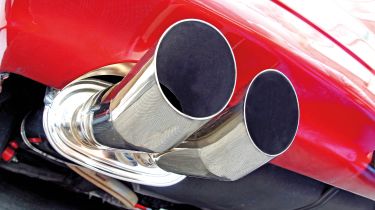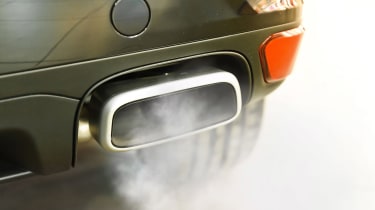Car noise limits: UK laws, noise camera enforcement and how to report loud engines or exhausts
The majority of readers support tougher rules on car noise; we explore the tech cracking down on anti-social exhausts

Cars are quieter than ever nowadays thanks to the presence of particulate filters and electrified powertrains. However, there are still many people who enjoy the throaty bellow of a revving engine – although it’s something that others understandably might perceive as a nuisance.
In fact, Auto Express data shows that over half of the 1,000 motorists we surveyed are disturbed in their homes by loud exhausts several times per month. One in three (33 per cent) of those affected complained about the impact on the quietness of their garden, whilst almost a third (30 per cent) said their sleep was disturbed by noisy passing vehicles.
Such an issue is why police forces across the UK have started deploying specialised noise cameras, which can help identify and subsequently penalise those driving around with an anti-social exhaust.
Now roughly three years on from their first trial deployment in the UK, we’re going to take a deep dive into what these things are, what the noise limits are in the UK, and what the penalty could be if your car’s too noisy.
What are car noise cameras?
Car noise cameras feature an automatic number-plate recognition (ANPR) camera alongside a microphone. The latter can listen for unreasonably loud exhaust notes, while the former scans the number plate of the offending vehicle and thus informs the police, much like a traditional speed camera.
The effectiveness of these units is hard to quantify, but a study by the Department for Transport following the initial trials found that while “at some locations not many excessively noisy vehicles were detected, the noise camera’s deterrent effect resulted in changes to driver behaviour and avoidance of the installation site.”
Are more car noise cameras being installed?
At the time of writing, car noise cameras are far from ubiquitous across the UK; only a handful of the nation’s police forces have begun trialling this type of technology.

Nevertheless, it’s certainly something that’s captured the public’s attention. Of those that we surveyed, almost two in three (60 per cent) thought more of these units should be installed, while 67 per cent called for greater penalties for disruptive exhausts.
However, it’s a little more complicated than shoving a pole into the ground and calling it a day – these cameras can be frightfully expensive. While an exact price is difficult to ascertain because this technology is still in its infancy, the aforementioned study by the Department for Transport said it cost around £13,200 per unit per year over a decade to operate. This would mean a camera would have to identify and fine two vehicles every day in order to be financially viable, thus making portable cameras the preferred option at this stage.
Nevertheless, several police forces are beginning to trial the use of noise camera technology; Hertfordshire Police told Auto Express that it kicked off the calibration stage of its own trials in July 2025 and will soon begin identifying and capturing offending vehicles.
Hertfordshire Police and Crime Commissioner Jonathan Ash-Edwards described how residents have “endured years of disruption from street racing and anti-social driving along the A405. This behaviour not only impacts the quality of life for families and older residents but also poses a real danger to road users.”
Can I be fined for having a car that’s too loud?
Yes, you can be fined under Section 59 of the Police Reform Act 2002 if your car has been modified to be significantly louder than the manufacturer originally intended. While this is somewhat of a grey area because many aftermarket parts are legal in the UK, police do have the power to give you an instant £50 fine or even take the car off the road until it’s fixed.
It’s also worth noting that the DVSA (Driver and Vehicle Standards Agency) in recent years brought a successful prosecution against a company that was advertising and fitting illegal car exhaust modifications in the UK.
With car noise cameras, however, Ash-Edwards describes the police’s approach as “firm but fair”. For first-time offenders, the police will typically send out a warning in the form of what has been described as an “educational letter”. Beyond this point, if drivers continue to offend and/or refuse to amend their excessively loud exhaust, a fine can be delivered via the post.
What is the UK car noise limit?
The first ‘Motor Cars (Excessive Noise)’ regulations were introduced back in 1929, and limits have been progressively tightened since then.
In 2016, the UK adopted EU regulation 2014/540, which set an initial noise limit of 72 decibels from 7.5 metres away. This is set to go down to just 68 decibels for new vehicles type-approved after July 2026, alongside revisions to the car noise test to make it more accurate.
Incidentally, legislation states that ‘off-road vehicles’ are allowed to be one decibel louder, and wheelchair-accessible vehicles and armoured vehicles 2dB louder – accounting for the fact these tend to require modifications to the base vehicle.
Perhaps most interestingly, however, is that throughout the DfT’s trials, the ideal threshold for noise cameras was found to be as high as 95dB to eliminate anomalies from things like lorries, motorcycles and construction vehicles.
Is car noise a factor in the MoT test?
Car noise is included in the annual MoT test, but it’s up to the tester’s discretion as to whether a car passes or fails.
The MoT inspection manual has ‘Nuisance’ as a category in section 8 and under this the requirements for noise, emissions, leaks and lighting are mapped out. MoT testers are told to check noise proofing under the bonnet and exhaust silencers, but invited to use their judgement to assess whether the amount of noise generated is “unreasonably above the noise level you’d expect from a similar vehicle with a standard silencer in average condition”.
If the car is above these levels, it should fail the MoT, but there is no actual noise test carried out as part of the MoT. With this in mind, 63 per cent of those Auto Express surveyed believe there should be stricter rules, perhaps in the form of a dedicated test.
Did you know you can sell your car through Auto Express? We’ll help you get a great price and find a great deal on a new car, too.










